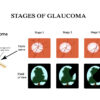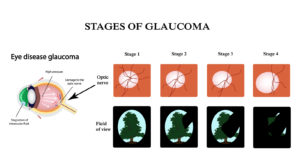
Can You Prevent Glaucoma?
Macular degeneration takes the lead as the biggest cause of vision loss in America. But in a close second? You guessed it – glaucoma. We know there isn’t much you can do about macular degeneration, but can you prevent glaucoma? Luckily, the answer is yes, there are a few things you can do to take the first steps to prevent glaucoma.
In this article, we go deeper into the causes of glaucoma and provide some tips on the best exercises, food, and medical treatments to prevent glaucoma and even help slow its progression if you already have it.
Types of Glaucoma
First things first: we need to understand what this disease entails. Glaucoma is actually a group of diseases. They’re all caused by high pressure within the eye, resulting in optic nerve damage.
The optic nerve is similar to a large cable composed of thousands of small wires. Each of these small wires carries images from your retina to your brain. Built-up pressure, or glaucoma, can damage these small wires, causing blind spots to develop in your vision. As you can probably imagine, if this disease goes untreated, it can lead to total blindness.
The most common type of glaucoma is primary glaucoma, which can be divided into two subtypes:
- Open-angle glaucoma: Open-angle glaucoma is the more common of the two. It is caused by the drainage canal being slowly blocked over time. Your eye doctor can usually detect this during your annual check-up.
- Closed-angle glaucoma: Closed-angle glaucoma is also known as acute glaucoma. It’s characterized by blurred vision and acute pain in the eye. This form is less common and does not have the gradual build-up that open-angle glaucoma does. If you feel sudden, acute pain in your eye, head to the doctor’s office right away.
Other types of Glaucoma:
- Childhood glaucoma: Also known as congenital glaucoma. This is a rare form and is usually diagnosed in children before they reach one year of age. It’s caused by problems in the development of the drainage canals before birth.
- Normal tension glaucoma: This type of the disease is less common, and as the name suggests, it isn’t associated with the higher intraocular pressure that primary glaucoma patients experience. Instead, patients experience mostly normal eye pressure. This type of glaucoma is usually hereditary.
A Silent Thief
Glaucoma is often called the “silent thief of sight” because it causes a gradual loss of sight. Many people do not even realize that they have a problem until extensive damage has been done.
According to the American Optometric Association, risk factors for developing glaucoma include the following:
- Family history: Is glaucoma hereditary? The answer is, unfortunately, yes. People with parents or other relatives who have had glaucoma are more likely to develop the disease.
- Age: People over the age of 40 have a higher risk of developing glaucoma.
- Diabetes: People suffering from diabetes are at a higher risk.
- Race: An African and/or Afro-Caribbean heritage raises your risk by four to five times the levels of other races. It’s also more likely to show up at an early age.
- Eye injury: Eye injuries or surgery can increase your risk of secondary glaucoma.
- Steroid use: Extended use of steroids may increase the risk of developing glaucoma.
- Myopia: People who are extremely nearsighted are at greater risk of developing glaucoma.
Recent medical advances have lowered the risk of losing your sight if you have glaucoma. New techniques are now available to diagnose and treat the disease.
Glaucoma Treatments
If you have recently been diagnosed with this disease, you may be wondering how to prevent glaucoma from worsening. There are steps that you can take to prevent the onset of glaucoma, especially in high-risk patients. Aerobic exercises and a diet low in saturated fats can help prevent eye problems that cause glaucoma. Lowering your intake of saturated fats is a good first step. But, it’s also important you add foods to your diet that contain the vitamins and nutrients that benefit your eyes. These ideas can all help you prevent vision loss from glaucoma.
Foods to Prevent Glaucoma
Changing your diet has a two-fold benefit for your health. It will provide the vitamins and minerals you need for healthy eyes. And, those same vitamins will also benefit the rest of your body. While high eye pressure doesn’t always go hand in hand with high blood pressure, there is often a connection. Your eyes depend on blood flow just as the rest of your body does. The best way to control your high blood pressure is through diet and exercise.
A healthy diet that is low in saturated fats can help prevent glaucoma. You can find saturated fats in red meats and dairy products. Use vegetable oils when you can, because this is a great way to incorporate omega-3 into your diet. A diet high in vegetables, fish, and chicken offers the best results. In fact, a recent study found that those who partake in the Mediterranean diet are at a lower risk of developing the disease.
However, many people just don’t have the time to eat as much as a truly healthy diet requires. Many of us skip breakfast and grab lunch on the run. We might only sit down to eat dinner when our schedule permits it. For people with a fast-paced lifestyle, an eye vitamin for glaucoma may be the best option. These are all great ways to lower eye pressure naturally.
An Active Lifestyle to Prevent Glaucoma
We know that regular exercise can help lower blood pressure, so it makes sense that it may help encourage low eye pressure as well. However, before starting an exercise program, talk to your medical professional. They can help you determine what exercises you should start with. They’ll guide you on how often you should exercise. For some people, it’s necessary to start out slowly and build up an exercise program over time, especially if you are interested in high-impact exercises that may exacerbate glaucoma symptoms.
Regular Checkups with Your Eye Doctor
Your eye doctor can be your best friend. Take advantage of their knowledge and experience with eye health. Anyone over 35 should talk to their doctor about tests to measure eye pressure. If you have any of the risk factors we’ve discussed today, talk to your doctor about scheduling eye exams more frequently. As technology improves, there will hopefully be more and more advanced ways to detect glaucoma early. For now, if you suffer from the disease, they can likely prescribe some helpful eyedrops for glaucoma that will mitigate your symptoms.
For example, researchers are currently working to determine whether the human eye can experience optic nerve regeneration. Currently, they are finding that small invertebrates (like frogs) can regrow damaged optic nerves, and they are looking into how they could mimic this in the human eye. This would be a huge leap in glaucoma treatment.
The one thing you can do that won’t cause harm is improve your lifestyle. You have complete control over what you eat and how active you are. Take your health into your own hands; quit smoking and drink less. Eat your vegetables and get eye-healthy nutrients. Take a vision-boosting supplement for convenience. Your health is your biggest asset; take care of it and it’ll take care of you.
Our Rebuild Your Vision Ocu-Plus Formula Contains All 17 Vitamins, Minerals, and Herbal Supplements to Protect Against Glaucoma!














was diagnosed with Glaucoma I had cataract surgery last Nov, I cannot see out of my left eye I sometimes can see out lines. I was very disappointed in my optemoligist as it will be eight months till I see him. I have 2 different eye drops one twice a day and the other one at night. Do you have any suggestions. Thank you, Bettie from Canada
I have been diagnosed with a very small angle in the eye 0 – 1 degree. The specialist recommended a laser peripheral iridotomy to prevent future glaucoma. This was discovered as he wanted to give me atropyn to dilate the eye to see the retina and he said it was not advised for such a small angled eye.
I am wondering if I should have this laser treatment?
Hi
Over here in the UK we have reasonable eye care. I’m now 39 and have been living with glaucoma since the age of 20. I have lost about half the sight in one eye and the description of the condition as being a ‘silent thief’ is a good comparison.
I’ve had surgery (trabeculectomy)- basically a hole in the surface of the eye with a flap of tissue stitched to enable eye fluid to drain more freely. It was extremely uncomfortable for the first week in recovery and the weeks after a hard but 3-months later I’m very comfortable. What is daunting is the need for the other eye to have the same procedure since the majority of my sight is via the ‘good eye’ which now needs preventative care. Quite hard when running a family and a business!
Other treatments have been in the form of eye drops: timolol / travoprost and simbrinza which has harsh side effects however your eyes become immune to these treatments and eventually surgery becomes necessary. My advice is – take the surgery since it halts the advance of this awful diseaese
Hi Tyler,
I am 24yrs old. I am having high myopia -10.25 & -10.75
In a span of 2 months my eye pressure went from 16 (both eyes) to 24(right) , 23 (left eye).
Doctor prescribed me to take eye drops (travatan Z) after using the eyedrops for the first time my eyes became red, and then doctore suggested me to move to lumigen now.
Are these eye drops really helping to reduce the eye pressure ?
in what ways i can take care of my health?
hi sir,
I recently came to know my rt optic nerve is slightly affected when i went for eye exam. iam having sight -6.00 in both eyes, should i do eye exercises, if ido the sight is reduced how come i know ,i am 29yr, what multivitamins i can use, iam having one kid, can i plan for 2nd kid why b’coz my optic nerve affected so in confusion wheather to conceive or not, kindly pleaze suggest genuinely and what suggest me exercises and vitamins for how long i have to use….
Hi Sri,
I would recommend talking with your eye doctor. He will know your situation best.
I was told that BILBERRY is very good for vision. The americans could not do night flying the british did because they used a lot of BILBERRY. I was using it but had to stop because i use plavix. Good luck Pat Im talking about night flying during the 2nd World War.
Glaucoma – can be prevented in most cases – by careful eating – and a healthy lifestyle..
Things to do is the following:
1) no Coca Cola
2) no fizz drinks of any form
3) no caffeine … and
4) no coffee
5) no real strong tea (eg English tea)
6) no milk
7) no cheese(note goats milk and cheese may be okay….
8) no burgers and fast foods.
9) drink at least – 4 cups (250ml)of distilled water a day… this helps to detox the body…
10) eat watercress and rocket salads predominantly…
11) eat only 50-100 gm red meat per week – and stir fry the meat – without condiments and too much oil.
This diet seems very harsh – but what is best..??? – glaucoma, or a good diet.??
Also – use Tyler’s OCU PLUS tablets – they work extremely well…but the diet must be clean and mean…. Thanks folks.
Spencer.
10) no alcohol or wines
this seems to be rather harse
wonderful news- hope it works
does avistin injection help AMD
Hi Merv,
Avastin was initially created as a cancer medicine that interferes with the growth of cancer cells. Avastin is FDA approved for treatment of specific cancers but not macular degeneration.
I suggest talking with your eye doctor about Avastin and your specific case as Avastin has been mentioned to help in some patients who have macular degeneration, but not to cure it. Also be aware that many people have complications when using Avastin.
To your vision — for life,
Tyler